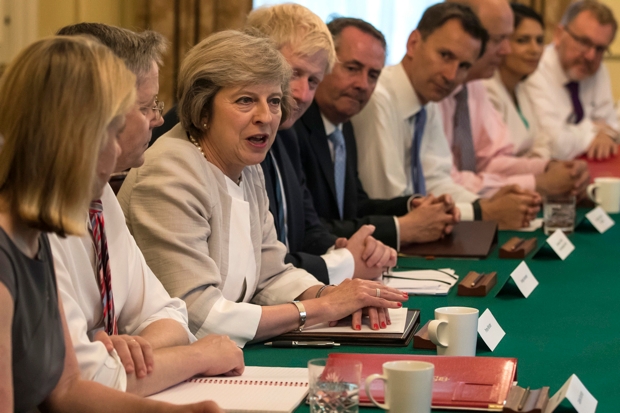In the post-Brexit upheaval, the Women’s Equality Party (WEP) has fallen out of sight. Its members once told us ‘WE can, WE will’, but now WEP isn’t doing anything at all. Not since 24 June when leader Sophie Walker offered her most prophetic statements to date. In Newsweek Europe, she wrote that post-Brexit, we would urgently need ‘women on the table’, and that ‘Britain leaving the EU means more women will get involved in politics’.
Little did she know her words would ring true, in the most unexpected way; as weeks later, a woman would not only be on the table, but head of it. And since Theresa May became Prime Minister, it’s been win, win, win for the ladies – with Amber Rudd, Justine Greening and Liz Truss now in some of Britain’s top roles.
It’s not been a great year for WEP, with Walker losing out on the chance of London Mayor in May. And with so many ladies running the country, its relevance looks increasingly tenuous. Now that there’s concrete evidence of gender equality in politics, I suspect WEP backers don’t know what to do with themselves; they are possibly casting their eye around for other evidence of gross sexism. Bowls teams, perhaps.
For many of my friends, WEP was hailed as a revolutionary party. But I smelt trouble from the start. I always took issue with its false premise: that women are losers in life – incapable of succeeding without its motherly hand.
Faults became clear in WEP’s speculative and poorly researched manifesto. The sort of document that makes blokes actually think women can’t be good at science. It said things like: ‘often men’s jobs are seen as an investment while women’s jobs are seen as expenses to be cut,’ with no evidence to back this statement up. WEP has always focused too much on doom and gloom. Another part of its manifesto says that girls are ‘told in schools that their gender limits their future options’, while ignoring the fact that girls now constantly outperform boys academically.
Despite claiming to be a party for women, its central focus has been telling girls that society hates them. And for that reason I hate WEP. I can see entirely how it came about; a symptom of 21st century victim politics. Over the last decade, it has become increasingly easy to whinge your way into activism. Stories of adversity – exaggerated or otherwise – have become a currency, allowing campaigners to say: ‘Listen to me, I’ve had it hard’. Saying you’re a woman is an immunity badge; criticism charged at us may now be classed under unchallengeable terms. ‘He didn’t like my ideas; that was covert misogyny.’
What I hope May’s Cabinet signifies is the death of this cynical type of campaigning that turns girls into helpless creatures waiting to be saved by external intervention. May’s Cabinet are tough and robust; you don’t get the sense that Rudd ever crawled into May’s office complaining about gender inequality. I suspect she follows May – as do Truss, Greening and the rest of the ladies – and is ‘somebody who just gets on with the job.’
Of course, it’s not just the Tories who have (actually) broken the glass ceiling. Love her or hate her, Nicola Sturgeon is giving everyone a run for their money. Apart from suddenly wearing pink, Sturgeon has never made her femininity a large part of her political identity. I suspect SNP voters didn’t chose Sturgeon because they were concerned about gender inequality; they thought she was good, female or not.
It’s no longer enough just to say: ‘I’m a woman, give me a job in parliament’. Politics is more meritocratic than ever – but that’s good, because women win in a meritocracy. That’s why I was slightly baffled when, on Channel 4 a few days ago, Angela Eagle said she should take over Jeremy Corbyn, because: ‘It’s about time the Labour Party, the party of equality, had its first female elected leader.’
Oh, Angela. Hasn’t she learnt anything? WEP is on its way out; women are on their way in, without the support of patronising political groups. Eagle is now out of the Labour leadership contest, and will be remembered for playing the gender equality card. But the latest round of political appointments show that gender doesn’t have to be leveraged to gain success. Only the belief that: ‘I can, I will.’





Comments